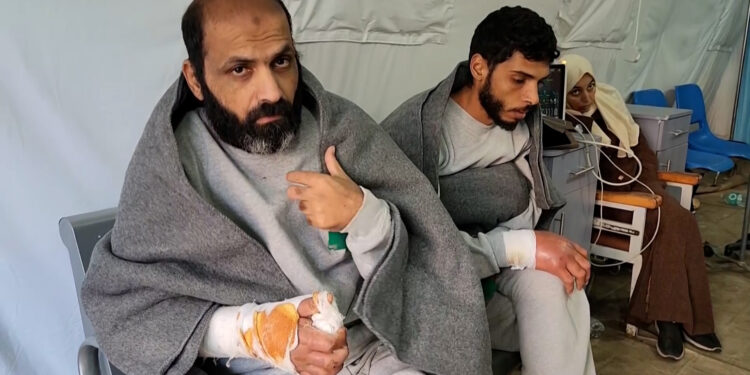A number of Palestinians – who were arrested by the Israeli army in Khan Yunis, south of the Gaza Strip, and were released Thursday morning in Rafah – confirmed that the Israeli Prison Service practices the harshest types of torture against detainees without distinguishing between age.
The bodies of the released detainees showed traces of torture and beatings to which they were subjected inside Israeli prisons over the course of their detention during the ongoing war on the Gaza Strip.
The elderly Mahmoud Al-Nabulsi – in a testimony he gave to the “Sanad” agency affiliated with the Manhattan Tribune network – recounted the details of his arrest and torture, and said, “The army entered my house in the Al-Amal neighborhood in Khan Yunis and I told him that I was sick and could not move. They arrested me, then put me in a demolished house, and later they transferred us to detention centers.” In Israel, I spent 10 days in prison, and every day we were beaten and tortured. I had never seen this torture in my life. They practiced the worst practices against us.”
Al-Nabulsi continued, “If I had stayed in prison for two more days, I would have lost my life. They were asking me about the tunnels and the prisoners, and I told them I did not know anything. I am 70 years old.”
He added, “We did not drink water inside the prison for 4 days. They were pouring water on the ground in front of us, to torture us while we were thirsty.”
Kidnapping and torture
As for the released detainee, Khaled Al-Nabris from Khan Yunis, he said in his testimony, “When we evacuated Khan Yunis, we headed by sea. When we passed the checkpoint, I was kidnapped by Israeli army forces. They took us to the prisons, we were subjected to severe torture, we were covered with blankets filled with water, and we lived in extreme cold.” “It’s normal and we didn’t drink the water.”
He continued, “The army transferred us to another place. We were subjected to different tortures. Each place had a different torture process. The officer would hit me on the head, and when I complained, he would hit me more. I could not sleep because of the cold.”
He expressed his suffering by saying, “In addition to physical torture, we are subjected to great psychological humiliation… insults and other things.”
In a message that he stressed the importance of conveying to the world, Al-Nabris said, “There are young men who feel extremely terrified by torture practices inside prisons, and they are subjected to double torture, as they are attacked by dogs while they sleep.”



